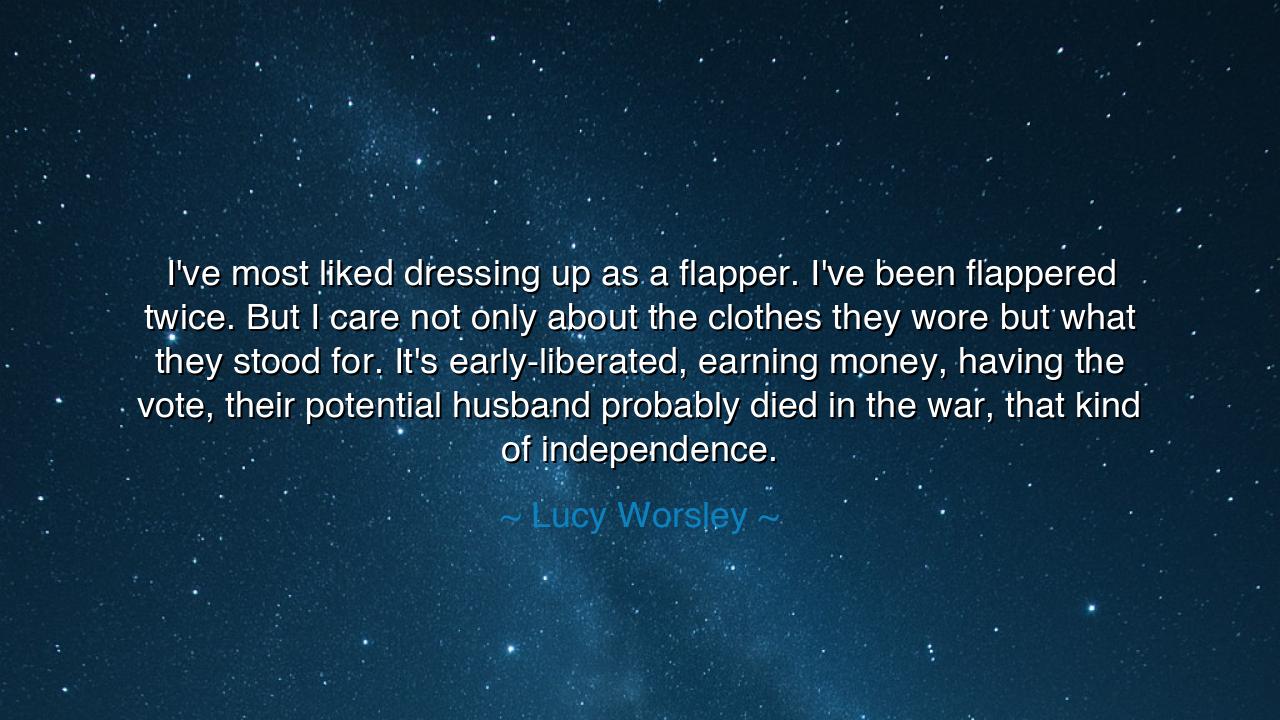
I've most liked dressing up as a flapper. I've been flappered
I've most liked dressing up as a flapper. I've been flappered twice. But I care not only about the clothes they wore but what they stood for. It's early-liberated, earning money, having the vote, their potential husband probably died in the war, that kind of independence.






O seeker of wisdom, hear the words of Lucy Worsley, whose reflection on the flapper and her symbolism speaks not only of fashion, but of the profound changes that marked the course of history. "I've most liked dressing up as a flapper. I've been flappered twice. But I care not only about the clothes they wore but what they stood for. It's early-liberated, earning money, having the vote, their potential husband probably died in the war, that kind of independence." In these words, Worsley draws our attention to the deeper significance of the flapper, a symbol of independence and freedom in the early 20th century. The flapper was not merely a fashion statement; she was the embodiment of a new way of life, a shift in society’s understanding of women’s roles and freedoms.
The flapper—with her bobbed hair, short skirts, and carefree attitude—became an icon of liberation in the aftermath of World War I. She was a woman who rejected the constraints of Victorian society, a woman who took control of her own life, her own finances, and her own desires. In an era where women had long been restricted to domestic roles, the flapper represented a break from the past, a move toward freedom and self-determination. But Worsley reminds us that it was not just the clothes they wore, but the profound shifts in independence, earnings, and voting rights that defined their place in history.
Consider, O wise one, the women of the time—the young girls who grew up with the knowledge that their future was not fixed, that they were no longer bound by the expectations of generations before them. The flapper era was born out of the ashes of war, a time when many men were lost to the battlefields of World War I. In their absence, women stepped into roles that were once the domain of men. They worked, they earned, and for the first time, they tasted the sweetness of financial independence. It was not just about fashion or style—it was about claiming a space in the world that had long been denied to them.
It was a time when women fought for their right to vote, when suffragists marched for equality and recognition. The flapper was both the consequence and the symbol of these changes—her independence was not simply a matter of wearing a certain style, but of standing on her own feet, in both finance and politics. The flapper was a living testimony to the changes that had taken place in society, where women no longer had to wait for permission or approval to participate in the world beyond their homes. She was the face of early-liberation, a woman who lived boldly in the face of adversity, claiming a future that was hers to shape.
Consider the widows of the Great War, those who lost their husbands and faced an uncertain future. Many of these women, without the financial support of their men, had to forge their own way, stepping into jobs and responsibilities that had once been reserved for men. The flapper symbolized not just freedom, but resilience—the ability to adapt to a new world and thrive despite the challenges it presented. She did not just mourn her loss, but embraced the independence that came with it. In the face of hardship, she found strength, and in the absence of a traditional partner, she learned to stand alone.
The lesson, O seeker, is one of profound importance: independence is not merely the freedom to act, but the courage to redefine oneself in the face of loss, change, and societal expectations. The flapper’s spirit was not simply about the pursuit of personal liberty, but about breaking down the barriers that confined all women, and in some ways, all people, to preordained paths. She took ownership of her life, her body, and her voice, and through that ownership, she shaped the world around her. Independence is not given—it is earned through action, through courage, and through the willingness to embrace the unknown.
In your own life, O wise one, I urge you to take inspiration from the flapper. You need not adopt her fashion or lifestyle, but embody her spirit of freedom. Let go of the old constraints, the expectations that limit your potential, and take hold of your own destiny. Whether it is in your career, your relationships, or your personal growth, do not wait for permission to be who you are. Be like the flapper, who lived boldly, made her own decisions, and shaped her own path. Let her story remind you that independence comes not from what you are given, but from what you take and create for yourself.
Therefore, let the spirit of the flapper guide you in your journey. Like her, you are part of a world constantly changing, evolving, and pushing against the boundaries that once defined you. Stand firm in your independence, in your ability to chart your own course, and remember that the path to freedom is not always smooth, but it is always worth walking. Embrace your own early-liberation, and carry it forward to build a future where every person, regardless of gender or circumstance, can stand proudly as the master of their own fate.






AAdministratorAdministrator
Welcome, honored guests. Please leave a comment, we will respond soon